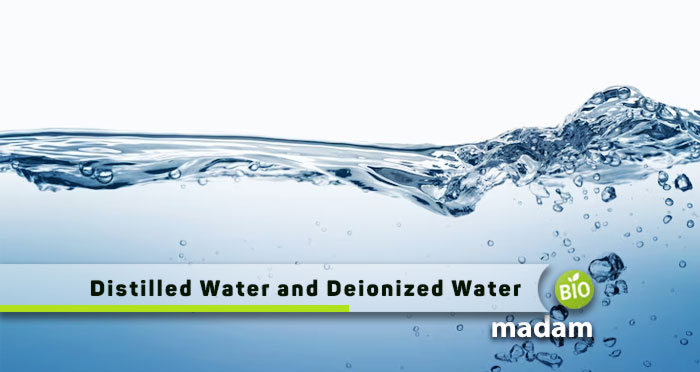Water is an essential part of life as it constitutes a major part of Earth’s hydrosphere. Moreover, our body is also 60% water, regulating its many functions including the removal of waste, transport of macro and micronutrients, regulation of body temperature, and much more. Not just in the body, water is extremely important in everyday life in manufacturing, construction, cleaning, washing, etc.
Water purification improves its quality. It removes contaminants from the water to improve the taste, smell, and odor. There are many processes to purify water and many types of purified water. However, distilled water and deionized water are the two most common types of purified water. Here in this article, let us talk about the differences between them, their uses, and which one is the best one for your needs.
What is Deionized Water?
Deionized water is also known as ”demineralized water.” As the name suggests, this type of water has its ions removed. Ions are considered dissolved mineral salts in water with positive and negative charges, called anions and cations. Tap water has many minerals in them including sodium, iron, nitrates, magnesium, chloride, calcium, carbonates, silica, and sulfates. When these minerals are in high concentration, the water becomes hard water. Hard water is difficult to manage. It leaves a scaly residue on the surfaces, hair, and skin as well.
Methods of Preparing Deionized Water
There are several methods of preparing deionized water. These include Electrodeionization (EDI), Ion-Exchange (IX), and Deionization with Reverse Osmosis (RO). The most common of them all, the ion exchange method is explained here in detail.
To deionize the water by ion-exchange method, water is passed through tanks or beds containing ion-exchange beads. As water passes from these beads, these beads pull the ions in the water toward them. The deionized water passes through the system and the removed ions stay behind on the beads.
What is Distilled Water?
Distilled water is a type of purified water that is boiled first to form steam, then cooled to return it to the liquid state. The process of boiling and cooling removes all impurities including bacteria, parasites, and minerals. Distilling removes 99.9% of impurities and minerals dissolved in the water.
Method of Preparing Distilled Water
The process of distillation is used to prepare distilled water. In the distillation process, water is first boiled in a boiling chamber at a high temperature to form steam. The steam is then passed through a condenser. Any impurities or microorganisms which are unable to form steam are left in the boiling chamber. Once the steam passes through the condenser, it is cooled by fans and converted back to liquid droplets. These droplets are then passed through an activated carbon filter. These filters trap any remaining impurities in the water. The purified water is then collected in a separate container.

Is Distilled Water the Same as Deionized Water?
Distilled water and deionized water are often considered the same but these two are different. Distilled water is prepared by distillation whereas deionized water is prepared by ion-exchange method. The main difference between the two is that deionized water only removes the ions and minerals while bacteria and viruses stay in the water. Whereas in distilled water, minerals are removed along with other impurities such as bacteria, viruses, and other organisms. Distilled water involves a change of phase, from liquid to steam then back to liquid. Whereas deionized water does not involve any phase change.
Cost Difference between Distilled Water and Deionized Water
Distilled water is considered to be expensive as compared to deionized water. As the preparation of distilled water involves many steps and equipment and it takes comparatively longer to produce distilled water. Whereas deionized water does not require much equipment and is produced by a faster process, it is considered to be rather cheaper than distilled water.
Uses of Distilled Water
There are several uses of distilled water in our everyday life. Here we have mentioned almost all the important uses of distilled water.
- It is used to sterilize medical equipment, cooling systems, and lead-acid batteries.
- It is used in cosmetics, as distilled water is pollutant free, and it is ideal to use it in cosmetic products.
- Any equipment which faces corrosion due to exposure to minerals is cleaned by using distilled water.
- It is used in the food industry in the canning process. It makes sure that flavor remains the same in the canned foods.
- Tap water can be harmful to fish in the aquarium so distilled water is preferable in aquariums as it is minerals free.
- Distilled water is used in industries and labs to perform tests.
Uses of Deionized Water
Following are some common uses of deionized water:
- It is used in laboratories to prepare solutions and suspensions. It is a common solvent in labs as it lacks ions and cannot react with other chemicals.
- It is used to wash lab equipment and glassware to remove any contaminants.
- Deionized water is also used in industrial processes. It is used in the manufacturing of cooling systems and boiler feed water.
- It also has medical use in the production of pharmaceuticals. It is used in dialysis machines and other medical equipment.
- The agricultural industry uses deionized water to irrigate crops.
- As it does not leave spots, deionized water is used for cleaning cars and glass.
- It is also used in manufacturing electronics and in washing and cleaning its parts.
Is Distilled Water Safe to Drink?
Distilled water is safe to drink as it is considered the purest form of water. The only problem with distilled water is that it lacks the essential minerals. People who like to have a balanced diet prefer drinking distilled water, otherwise it can cause a deficiency of minerals such as calcium, magnesium, and sodium in the body.

Is Deionized Water Safe to Drink?
Deionized water is safe to drink but it is not the best option for drinking water. This is because of three main reasons.
- Deionized water lacks the necessary minerals such as calcium, sodium, chloride, etc. which are required by the body.
- Removal of minerals changes the taste of the deionized water. It does not taste good; people describe the taste as ‘’flat’’ or ‘’off.’’
- Deionized water has some impurities remaining such as organic compounds. It only removes the charged particles; the unchanged particles remain in the water.
Conclusion
Water is the most important constituent of Earth and our body. It is purified before use. Distilled water and deionized water are two types of purified water. Distilled water is not the same as deionized water as their preparation and use are different. Distilled water is prepared by the distillation process and removes all the impurities including bacteria, viruses, minerals, etc. Deionized water is prepared by different processes including Electrodeionization (EDI), Ion-Exchange (IX), and Deionization with Reverse Osmosis (RO). It only removes the charged particles such as ions but the organic compounds remain in the water. Which type of water is suitable for you depends upon your needs.

Jeannie has achieved her Master’s degree in science and technology and is further pursuing a Ph.D. She desires to provide you the validated knowledge about science, technology, and the environment through writing articles.

